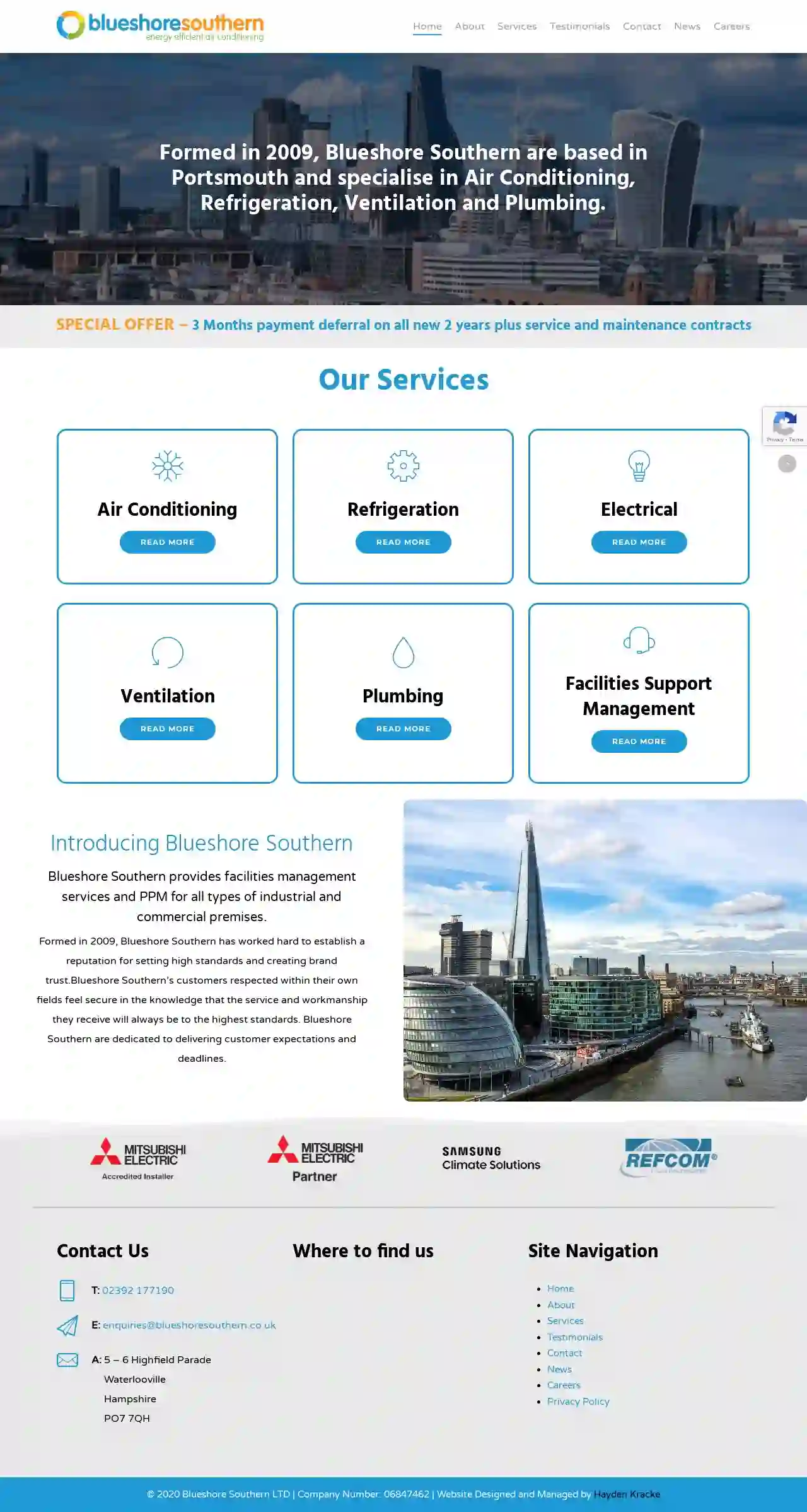Heat Pump Installation Andover
Find the best New Heat Pump Installation in Andover
Get up to 3 Heat Pump Installation quotes for your project today! Compare profiles, reviews, accreditations, portfolio, etc... and choose the best offer.
- Pl
Plumbtek Heating Solutions
1Havant, GB- Services
- Why Us?
Get Quote 
Blueshore Southern Limited
15 – 6 Highfield Parade, PO7 7QH, GBFormed in 2009, Blueshore Southern are based in Portsmouth and specialise in Air Conditioning, Refrigeration, Ventilation and Plumbing. Our customers, respected in their own fields, are secure in the knowledge that the service and workmanship they receive will always be to the highest standards. Blueshore Southern are dedicated to delivering on customer expectations and deadlines, working predominantly across the South East, West, London and Southern Home Counties. SPECIAL OFFER – 3 Months payment deferral on all new 2 years plus service and maintenance contracts
- Services
- Why Us?
- Gallery
Get Quote- Te
Temperate Heating Ltd
1Fleet, GB- Services
- Why Us?
Get Quote - Ma
Martin Heating & Plumbing Ltd
4.65 reviewsFleet, GB- Services
- Why Us?
Get Quote - In
Interskill Plumbing & Heating Ltd
1Fleet, GB- Services
- Why Us?
Get Quote - Co
Corrigenda Ltd
3.710 reviewsGosport, GB- Services
- Why Us?
Get Quote - Oi
Oil Range Service
44 reviewsWaterlooville, GB- Services
- Why Us?
Get Quote - St
Star Refrigeration
1Fleet, GB- Services
- Why Us?
Get Quote - Bo
Boiler Service Basingstoke
51 reviewsBasingstoke, GB- Services
- Why Us?
Get Quote - At
Atlantis Plumbing & Heating Ltd
52 reviewsWaterlooville, GB- Services
- Why Us?
Get Quote
Over 16,895+ HVAC Businesses registered
Our HVAC companies operate in Andover & surroundings!
HVACCompaniesHub has curated and vetted Top HVAC Companies arround Andover. Find a top & trustworthy contractor today.
Frequently Asked Questions about Heat Pump Installation
- Energy Efficiency: Heat pumps are highly energy-efficient, especially in moderate climates.
- Year-Round Comfort: Heat pumps offer both heating and cooling functions, providing year-round comfort control.
- Improved Indoor Air Quality: Heat pumps filter the air, improving indoor air quality.
- Environmentally Friendly: Heat pumps use a cleaner process than burning fossil fuels, which reduces greenhouse gas emissions.
- Cost Savings: The increased efficiency of heat pumps translates to savings on your heating and cooling expenses.
- Consistent Temperatures: Heat pumps deliver consistent temperatures throughout your home.
- Safe and Reliable Operation: Heat pumps are a safe and reliable way to heat and cool your house or business.
- Increased Home Value: Heat pumps can increase your home’s value by enhancing energy efficiency.
What is a dual-fuel heat pump system?
What is the difference between a single-stage and two-stage heat pump?
Single-stage heat pumps operate at a single capacity level. They either are on or off, which might impact comfort and reduce efficiency.
Two-stage heat pumps can operate at two capacity levels – low and high. The lower setting provides gentle heating or cooling for most days, while the higher setting kicks in during extreme temperatures, ensuring optimal comfort in all conditions. Two-stage heat pumps are generally more energy-efficient and offer more consistent temperature control than single-stage heat pumps.
What are the benefits of installing a heat pump?
Are heat pumps noisy?
What is a dual-fuel heat pump system?
What is the difference between a single-stage and two-stage heat pump?
Single-stage heat pumps have one output setting. They either are on or off, which can lead to temperature fluctuations and higher energy bills.
Two-stage heat pumps can operate at both high and low speeds. The lower setting provides consistent heating or cooling for most days, while the higher setting kicks in during extreme temperatures, ensuring optimal comfort in all conditions. Two-stage heat pumps are generally more energy-efficient and offer more consistent temperature control than single-stage heat pumps.
What are the benefits of installing a heat pump?
- Energy Efficiency: Heat pumps are more efficient than traditional systems, reducing your energy bills.
- Year-Round Comfort: Heat pumps offer both heating and cooling functions, providing year-round comfort control.
- Improved Indoor Air Quality: Heat pumps filter the air, improving indoor air quality.
- Environmentally Friendly: Heat pumps use refrigerant to transfer heat than burning fossil fuels, which reduces greenhouse gas emissions.
- Cost Savings:Lower energy bills and reduced maintenance costs can save you money in the long term.
- Consistent Temperatures: They provide better temperature control compared to traditional on/off heating and cooling systems.
- Safe and Reliable Operation: Heat pumps are a safe and reliable way to heat and cool your property.
- Increased Home Value: Heat pumps can increase your home’s value by enhancing energy efficiency.